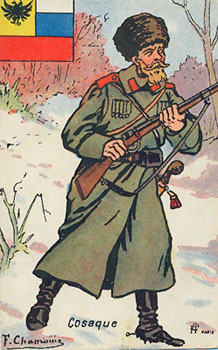
Nice image of a stylized cossack depicted on a French postcard circa 1914-1915. Most of the Russian troops who marched into battle in those years were not this well armed, fed or dressed; most also died. One Russian statesman who foresaw the catastrophe that a war would bring to Russia was Peter Durnovo.

Petr N. Durnovo (Пётр Николаевич Дурново, 1844‑1915) was one of imperial Russia's most hated enforcers of the status quo, and usually seen simply as a reactionary policeman--After his service in the Russian navy, most of Durnovo's career was spent in the Russian government in some sort of association with the the police: Ministry of Justice (1872‑1881), Ministry of the Interior (1881-1883), head of the Police Department of the Ministry of Interior (1883‑1893) where he helped to suppress the populist revolutionary movement, Governing Senate (1893-1900), Deputy Minister of Interior (1900‑1905) and Minister of Interior (November 1905‑April 1906). It was Witte himself who chose Durnovo in October 1905 to serve in his cabinet, and it is still unclear why Witte selected Durnovo since they held completely different political views and ended up just working at cross-purposes. Durnovo was removed from his position when Witte resigned in the spring on 1906 because the tsar wanted a clean slate of ministers to deal with the newly-elected Duma. Durnovo entered the State Council where he lead the extreme right wing. He often clashed with Stolypin while the latter was head of the Russian government. According to Patrick Rollins (see below for citation), Durnovo was "a decidedly honest, intelligent and able defender of conservative monarchism." He was not vicious, not arbitrary but acted within the law to maintain the status quo. He also also supported Jewish rights and the rights of non-Russian nationalities.
Although a died-in-the-wool conservative (OK, maybe a reactionary), Durnovo produced in February 1914 a memorandum addressed to tsar Nicholas II in which he clearly showed that he understood Russia's not-so-strong position in the world and that he appreciated the depths of Russian's internal problems.
Durnovo believed that a European war was inevitable given the Anglo-German naval rivalry, and that meant that Russia, because of the entente with England, would end up carrying the brunt of the land war burden for England. Russia would be unable to sustain the war effort and a catastrophic social revolution would ensue. Russia's eventual defeat would result in "hopeless anarchy, the issue of which cannot be foreseen." So Durnovo argued for a sweeping reappraisal of Russia's foreign policy and a rapprochement with Germany. He believed that German and Russian interests were complementary while a war between the two would only result in the destruction of both empires.
Some available sources:
- Wikipedia on Durnovo
- Why Germany and Russia? Lessons of History
- See the entry on "Peter Durnovo" by Patrick Rollins in The Modern Encyclopedia of Russian and Soviet History, vol. 10, pp. 58-61. There is also a separate entry on "Durnovo's Memorandum," pp. 61-64.